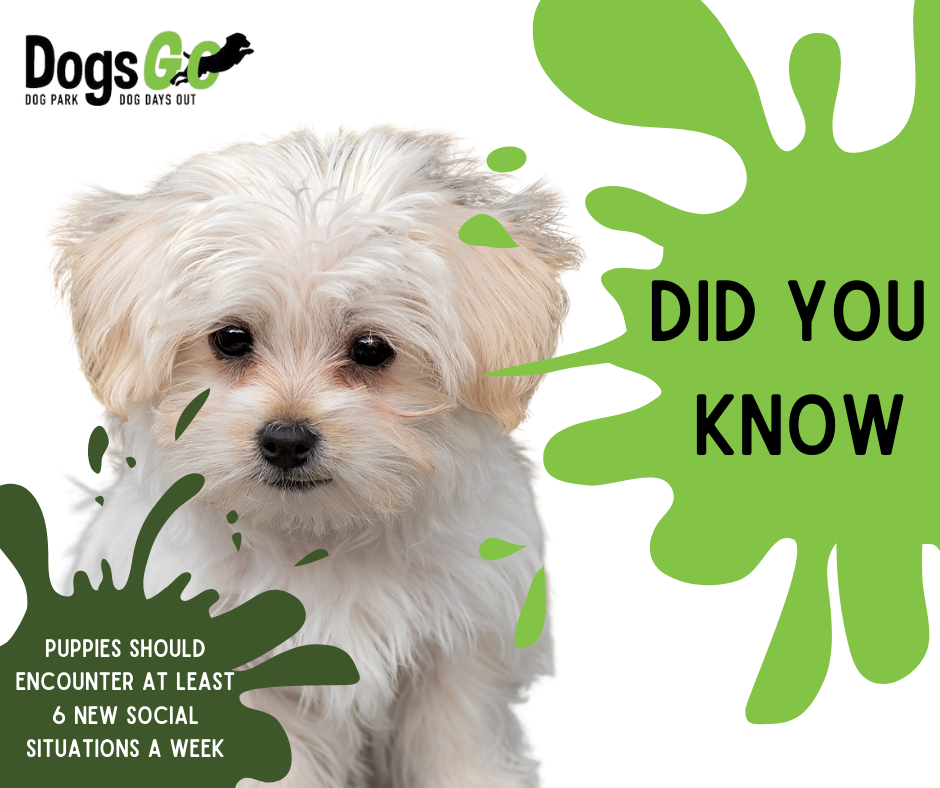6 Ways To Socialise Your New Puppy
Socialisation is far more than you may realise. Here are 6 tips to help.
Socialisation is far more than you may realise. Here are 6 tips to help.

Socialising your puppy is important so that when they grow up, the outside world isn't as unfamiliar to them or as scary. Socialisation isn't just about mixing your pup with other dogs - it involves exposure to different places, people, smells, sounds, animals and experiences. Puppies are particularly receptive to new experiences from 3 to 16 weeks of age - so make the most of this timeframe. Ideally your breeder will have started this important process of exposure to new things already - speak to them and find out what your pup has already been up to! Socialisation is easier for some dogs than it is for others. Some dogs will be more sensitive to certain experiences - your dogs breed, his genetics and life experiences so far will all dictate this. Take it slowly - and watch out for signs of stress or discomfort in your pup. Little and often is a good rule of thumb and the moment you think it is getting too much for your pup or he is getting tired - stop.
We have curated 6 helpful ideas for early enjoyable socialisation!
1) Before your pup is fully vaccinated, many owners believe that they cannot start socialising their pup. Whilst we do not recommend letting your doing walk anywhere outside, that doesn't mean you can't start the socialisation process! If you have a friend who has a fully vaccinated dog who is good with puppies, you could introduce the two dogs in a safe and secure private garden- but it is important that you know how this dog will react to a young and inquisitive pup. You can also carry your pup around outside and take him into places - just don't pop him down or introduce him to any dog with an 'unknown' temperament or vaccination status.
2) In the home - introduce your puppy to different textures - carpets rugs, tiles, wood, sand and foil. Puppies explore the world with their mouths - so supervise at all times. Let him walk on different textures - and splash with water! Let him explore and play (whilst supervised) with a plastic bottle, an empty cereal packet, a toilet roll tube - non toxic different shapes and textures are great fun for pups to explore.
3) Lots of dogs are fearful of fireworks or get startled by thunderstorms. You can find on YouTube and Spotify white noise recordings of cars, planes, fireworks, thunder, rain, babies crying etc. Playing this to your pup whilst he is young will help him get used to it. Keep the volume low to start with and the experience positive!
4) When you can leave the house try doing different walks on different days and at different times of day. It is really easy to stick to the same routine but mixing it up is extremely important for your pups development. Only let your pup off his leash if you are sure of his recall and you are safely away from danger. It is great to get your dog used to the car from early too. Take him on a train too if you can!
5 ) A dog park is the perfect place to socialise with your pup with other pups, but do the ground work first. Your pup should have encountered other dogs on leash before you visit a dog park and he or she should be more interested in them than anxious and afraid. If your pup is very anxious around one or two dogs, a busy dog park could be extremely overwhelming and set him back. Ensure that you attend a session especially for Puppies and if you do have any concerns, get in touch with the organisers prior to attending who should be able to advise and reassure you. Look for parks who offer inductions and beginner play sessions.
6) Visit the Vet! Having a dog who is fearful of the vet is stressful for both owner and dog. Pop in to your local vets practice (if allowed due to COVID- check with them first) and keep it positive by offering your pup a tasty treat upon arrival or letting them enjoy a fuss from the receptionist.
There is so much more I could write on this topic - but for now, I hope this helps – please don’t hesitate to get in touch if you would like more information on socialisation.
Sarah
About the Author

Sarah is a long time dog owner, lover and has completed many courses in dog training and dog behaviour. She has a special interest in canine nutrition.